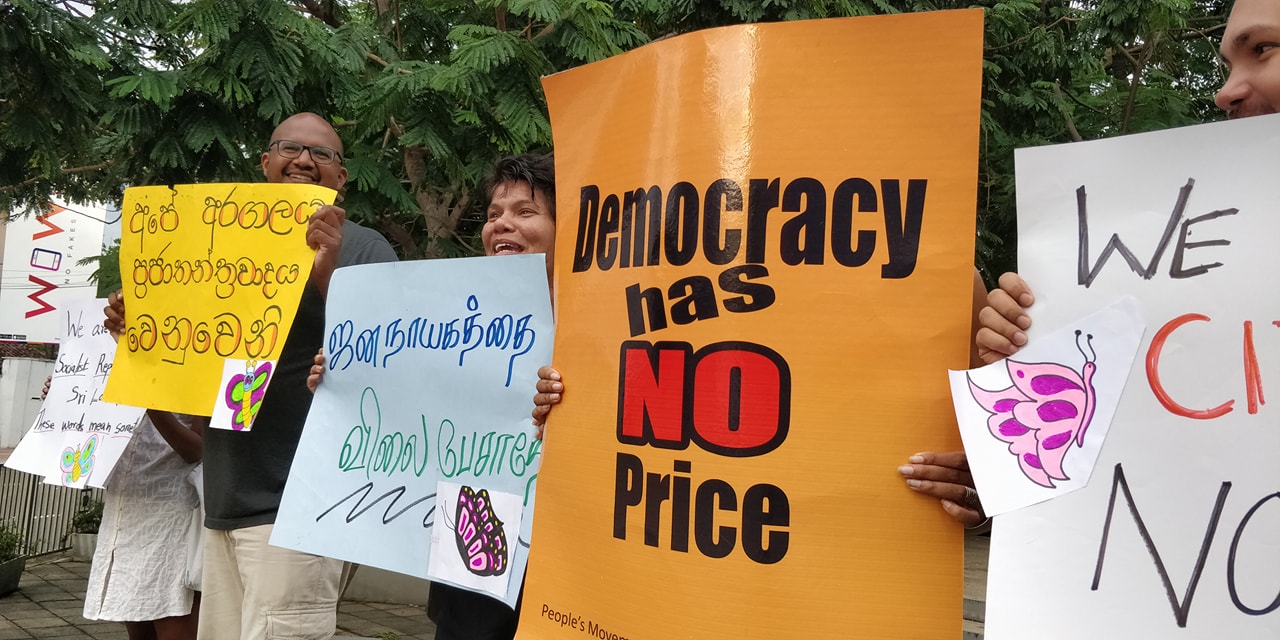Image: Pro-Democracy protestors took to street daily against the constitutional coup staged by president Sirisena in October 2018.
A short paper published by the Centre for Policy Alternatives (CPA) on key developments in the first 100 days of the present Government, as well as their implications for governance, the rule of law, reconciliation, human rights and democracy, concludes that the prospects for democracy and reconciliation in the immediate future are bleak but the multiple challenges may also galvanise democratic forces to come together to counter and challenge. Postindependence Sri Lanka has witnessed the resilience of civil society, judiciary, media and others, sometimes under extremely trying circumstances.
The paper highlights key trends and examines likely scenarios in the immediate future. This includes the possibility of sweeping constitutional, legislative and policy reforms that will likely define the future trajectory of Sri Lanka’s political culture.
Below we reproduce the conclusions of the paper and the report as a PDF file.
The future of Sri Lanka is likely to be centred around a populist presidency with diminished checks and balances and an influential group of professionals, former and present military personal directly loyal to the President playing key roles in the formulation of policy. The 100+ days of the Government indicate a radical shift in substance and symbolism, cultivating an image of a President who is devoid of pomp and the trappings of the office and cementing his campaign promise of security, stability, efficiency and discipline. With the SLPP likely to be the most successful at the Parliamentary Election and thus dominating the agenda of the next Parliament, there is a near certainty of speedy constitutional and legislative rolling back on key constitutional amendments and legal safeguards, thus paving the way for an authoritarian presidency and centralised government with limited checks and balances. Further, there are no outward political and personal divisions within the Rajapaksa family, with a united front likely to persist till the Parliamentary Elections.
The legislative and policy agenda post Parliamentary Elections will also likely see further measures to normalise and legitimise militarization and securitization with serious implications for governance, reconciliation and rights with a chilling effect on civil liberties, media freedom and dissent.
All this will likely be done with efficient speed with little to no opposition in Parliament. Considering the divisions within the UNP, it is unlikely they will be able to mount any form of robust opposition in the face of a powerful, popular President and party group with a comfortable majority. Considering the ongoing intraparty battles, questions also remain as to the relevance and future of some parties and alliances.
In the face of Sinhala Buddhist nationalism, fears revolve around the safety of Sri Lanka’s ethnic and religious minorities and space for a multi-religious and multi-ethnic society. Due to the trivialization and dismissal of minority claims and attempts to push through economic development without any meaningful consultation, ethno-nationalism will likely thrive under a powerful Rajapaksa regime with fears of new fault lines and bleak prospects for any form of genuine reconciliation. This is likely to exacerbate political and economic uncertainty. Considering the trends of the recent past, the present political and military leadership will counter any signs of unrest and instability with brute force, further consolidating power in the guise of stability and security.
The prospects for democracy and reconciliation in the immediate future are bleak but the multiple challenges may also galvanise democratic forces to come together to counter and challenge. Postindependence Sri Lanka has witnessed the resilience of civil society, judiciary, media and others, sometimes under extremely trying circumstances. It is to be seen whether Sri Lanka will yet again witness such resilience and resistance in the face of unprecedented challenges to its fragile democracy.
Read the full report as a PDF: Commentary-Sri-Lanka’s-Recent-Political-Challenges-Prospects-for-the-Future (1)
